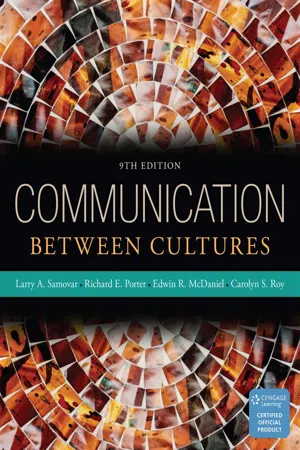Social Sciences
American Values
American values encompass a range of beliefs and principles that are considered fundamental to American society, including individualism, equality, freedom, and democracy. These values have shaped the nation's history, culture, and institutions, influencing everything from politics and economics to social interactions and personal aspirations. While interpretations and applications of these values may vary, they continue to play a significant role in shaping American identity and societal norms.
Written by Perlego with AI-assistance
Related key terms
1 of 5
3 Key excerpts on "American Values"
- eBook - PDF
- Larry Samovar, Richard Porter, Edwin McDaniel, Carolyn Roy(Authors)
- 2016(Publication Date)
- Cengage Learning EMEA(Publisher)
208 CHAPTER 6 • Cultural Values: Road Maps for Behavior Copyright 2017 Cengage Learning. All Rights Reserved. May not be copied, scanned, or duplicated, in whole or in part. Due to electronic rights, some third party content may be suppressed from the eBook and/or eChapter(s). Editorial review has deemed that any suppressed content does not materially affect the overall learning experience. Cengage Learning reserves the right to remove additional content at any time if subsequent rights restrictions require it. Please remember that contradictions often exist within U.S. values. The history of the United States is replete with examples of discrimination based on skin color, eth-nicity, gender, level of education, social class, sexual preference, and even choice of religion. Unfortunately, today, some people continue to employ these criteria to eval-uate others. While she acknowledges that many Americans have experienced periods of inequality, Hanson points out, “ Not all citizens have had equal rights throughout the course of the country ’ s history, but Americans nevertheless value the notion highly and strive toward this ideal. ” 21 Individuality and Privacy Often referred to as “ freedom ” by U.S. Americans, 22 individualism is perhaps the most revered U.S. cultural value and is a particularly salient social characteristic. Broadly speaking, individualism, as developed in the works of the seventeenth-century English philosopher John Locke, holds that each person is unique, special, completely different from all other individuals, and “ the basic unit of nature. ” 23 Locke ’ s view is simple — the interests of the individual are or ought to be para-mount, and all values, rights, and duties originate in individuals. Individualism commands so much influence among Americans that it gives rise to other U.S. values, such as personal initiative, self-reliance, and equal opportunity. - eBook - PDF
- Kenneth Fleischmann(Author)
- 2022(Publication Date)
- Springer(Publisher)
We need a different concept to unify the opposite ends of the false dichotomy. Are there factors that influence or determine the behavior of individuals, and which are transmitted among individuals within a group or society? Each person has a different set of principles that help to govern their behavior, which are influ- enced by and in turn influence others. Sociologists, anthropologists, psychologists, and others refer to these principles as human values. Human values intermediate between the individual and the group. In some ways, they are universal in nature, illustrating commonalities among societies (Schwartz, 1994). In other ways, they illustrate the diversity of individuals and societies (Parsons, 1935). A wide range of definitions of values have been developed over time. For example, the sociologist Parsons defines values as, “the creative element in action in general, that element which is causally independent of the positivistic factors of heredity and environment” (1935: 306). Building on Parsons, sociologist Spates defines values as, “those moral beliefs to which people appealed for the ultimate rationales of action” (1983: 28). Hitlin and Piliavin (2004) summarize a number of definitions of values, including anthropologist Kluckhohn’s definition of a value 9 as “a conception, explicit or implicit, distinctive of an individual or characteristic of a groups, of the desirable, which influences the selection from available modes, means, and ends of action” (1951: 395, cited in Hitlin and Piliavin, 2004). They also provide a definition by psychologist Rokeach that values are “enduring beliefs that a specific mode of conduct is personally or socially preferable to an opposite or converse mode of conduct or end-state of existence” (1973: 5, cited in Hitlin and Piliavin, 2004). - eBook - PDF
- Ian Shaw, Katharine Briar-Lawson, Joan Orme, Roy Ruckdeschel, Ian Shaw, Katharine Briar-Lawson, Joan Orme, Roy Ruckdeschel(Authors)
- 2009(Publication Date)
- SAGE Publications Ltd(Publisher)
One of the classical debates in philosophy and later in sociology is about whether values are embedded in human nature (values that are God given), or if human beings simply create values through social interaction. Modern understanding of this question is based on more empirically supported scientific models although other co-existing types of knowledge systems such as religion maintain traditional stands. In social and behavioral sciences it is asserted that human beings in social interaction gen-erate values and integrate them in structured systems. Values are either personal, that is, maintained by individuals and not necessar-ily shared by others, or are cultural, that is, they are shared by a group of people who define themselves as an in-group and are perceived as a distinct group by other groups. Values then are embedded as a system or web by cultural, societal, religious, ideological and other contexts in human societies. Driven and empowered by values individuals, groups and large constituencies of human beings make choices and decisions, thus generating politics. Related to the concept of value is the con-cept of morality. Morality refers to human actions based on dichotomized or paired values such as ‘good and bad’, ‘right and wrong’, and ‘disgusting and admirable’. Our personal morals such as our consideration of what is ‘good and bad’ operate as compasses of our actions, intentions, decisions, non-decisions as we seek to discriminate between good and bad in all these and other contexts.
Index pages curate the most relevant extracts from our library of academic textbooks. They’ve been created using an in-house natural language model (NLM), each adding context and meaning to key research topics.


